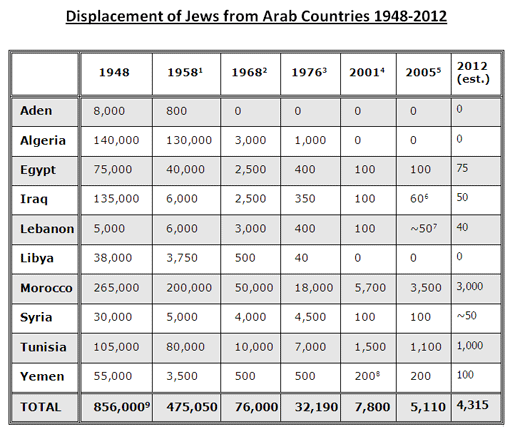|
|
MAIN
FACTS

Frequently
Asked Questions

Justice
for Jews from Arab Countries: Main Fact Sheet
I)
The Issue
" When
the issue of 'refugees' is raised within the context of the Middle
East, people invariably refer to Palestinian refugees, virtually
never to Jewish refugees from Arab countries.
II)
The Facts
-
For
over 2,500 years, Jews in substantial numbers resided in the
Middle East, North Africa, and the Gulf region - fully 1,000
years before the advent of Islam.
-
Following
the Muslim conquest of the region, under Islamic rule, Jews
were considered second-class citizens but were, for a period
of time, permitted limited religious, educational, professional
and business opportunities.
-
This
changed in the 20th century, as witnessed by a wide-spread pattern
of persecution and the mass violations of the human rights of
Jewish minorities in many Arab countries. Official decrees and
legislation enacted by Arab regimes denied human and civil rights
to Jews, expropriated their property, stripped them of their
citizenship, and other means of livelihood. Jews were often
victims of murder, arbitrary arrest and detention, torture,
and expulsions.
-
Upon
the declaration of the State of Israel's independence in 1948,
the status of Jews in Arab countries worsened as many Arab states
declared war or backed the war to destroy Israel. These events
triggered a dramatic surge in a longstanding pattern of discrimination
and abuse that made the lives of Jews in Arab countries simply
untenable. Jews were uprooted from their countries of birth
and in virtually all cases, as they fled, individual and communal
properties were seized and/or confiscated without any compensation
provided by Arab governments.
-
The
result - from an estimated 1,000,000 Jews resident in North
Africa, the Middle East and the Gulf region at the turn of the
century, today less than 4,500 Jews remain in Arab countries.
-
Yet,
when referring to Middle East refugees, the international
community refers only to Palestinians. In fact, there were
more Jews displaced from Arab countries (856,000)[1] than
there were Palestinians who became refugees as a result of
the 1948 Arab Israeli war (726,000)[2].
- The international
definition of a refugee clearly applies to Jews who had "a
well-founded fear of being persecuted for reasons of race, religion…"
(The 1951 Convention Relating to the Status of Refugees
-
In
reality, there were two refugee populations created
as a result of the longstanding dispute in the Middle East
- Palestinians and Jews displaced from Arab countries. Yet,
since 1947, the United Nations' predominant focus has been
on Palestinians:
i) 1088 resolutions on the Middle East, including 172 resolutions
on Palestinian refugees;
ii) Thirteen UN agencies and organizations mandated or newly
created to provide protection and relief to Palestinian refugees;
and
iii) Over the last 58 years, tens of billions of dollars have
been disbursed by the international community to provide services
and assistance to Palestinian refugees.
-
During
that same period, there were no UN resolutions; no support
provided by UN agencies; nor any financial assistance forthcoming
from the international community to ameliorate the plight
of Jewish and other refugees from Arab countries.
-
In
all relevant international bilateral or multilateral agreements,
(i.e. UN Resolution 242, The Road Map, The Madrid Conference,
etc.), the reference to 'refugees' is generic, allowing for
the recognition and inclusion of all Middle East refugees -
Jews, Christians and others.
-
The legitimate call to secure rights and redress for Jews displaced
from Arab countries is not a campaign against Palestinian refugees.
In any Middle East peace proposals, the rights and claims of
Palestinian refugees will be up for negotiation. It is important
to ensure that the rights of hundreds of thousands of Jews displaced
from Arab countries be similarly recognized and addressed.
-
It would constitute an injustice, were the international community
to recognize rights for one victim population - Palestinians
- without recognizing equal rights for other victims of that
very same Middle East conflict - former Jewish, Christian and
other refugees from Arab countries
.
[1] Roumani,
The Case 2; WOJAC'S Voice Vol.1, No.1
[2] United
Nations Conciliation Commission for Palestine, P. 18; United
Nations. Annual Report of the Director Genera of UNWRA, Doc.
5224/5223. 25 November 1952
[3] Mr.
Auguste Lindt, United Nations High Commissioner for Refugees,
Report of the UNREF Executive Committee, Fourth Session - Geneva
29 January to 4 February, 1957; and Dr. E. Jahn, Office of the
UN High Commissioner, United Nations High Commissioner for Refugees,
Document No. 7/2/3/Libya, July 6, 1967.
Country
Narratives
There
has been an uninterrupted presence of large Jewish communities
in the Middle East from time immemorial. The ancient Jewish communities
of the Middle East and North Africa (including in the Land of
Israel) has existed for over 2,500 years before the birth of the
modern Arab states.
One
thousand years before the advent of Islam, Jews in substantial
numbers resided in what are today Arab countries. For centuries
under Islamic rule, following the Moslem conquest of the region,
Jews were considered "dhimmis", or second-class citizens.
But they were nonetheless permitted limited religious, educational,
professional, and business opportunities.
It
is within the last 55 years that the world witnessed the mass
displacement of over 850,000 long-time Jewish residents from the
totalitarian regimes, the brutal dictatorships and monarchies
of Syria, Trans-Jordan, Egypt, Lebanon, Yemen, Iran, Iraq, Algeria,
Tunisia and Morocco.
The rise of pan-Arabism and independence movements in the 20th
century resulted in an orchestrated, multi-state campaign against
Zionism. These states vehemently opposed the establishment of
a homeland for the Jewish people. Hundreds of thousands of Jews
resident in Arab countries were ensnared in this struggle.
Immediately
before and after its declaration of statehood, the Arab world
sought to destroy the newly created State of Israel between 1948-49.
The rights and security of Jews resident in Arab countries came
under legal and physical assault by governments and the general
populations. In Syria, anti-Jewish pogroms erupted in Aleppo in
1947. Of the town’s 10,000 Jews 7,000 fled in terror. In
Iraq, "Zionism" became a capital crime. More than 70
Jews were killed by bombs in the Jewish Quarter of Cairo, Egypt.
After the French left Algeria, the authorities issued a variety
of anti-Jewish decrees that prompted nearly all of the 160,000
Jews to flee the country. After the 1947 United Nations General
Assembly Resolution on the Partition Plan, Muslim rioters engaged
in bloody pogroms in Aden and Yemen, which killed 82 Jews. In
numerous countries, Jews were expelled or had their citizenship
revoked (e.g. Libya). Varying numbers of Jews fled from 10 Arab
countries. They became refugees in a region overwhelmingly hostile
to Jews.
State-sanctioned restraints, often coupled with violence and repression,
precipitated a mass displacement of Jews. While the results were
similar, life became untenable and Jews were displaced from some
10 countries throughout the Middle East and North Africa. This
caused the Jewish refugee problem in the Middle East.
The result: over 850,000 Jews were uprooted from the lands where
they and their ancestors had lived for generations.


|



